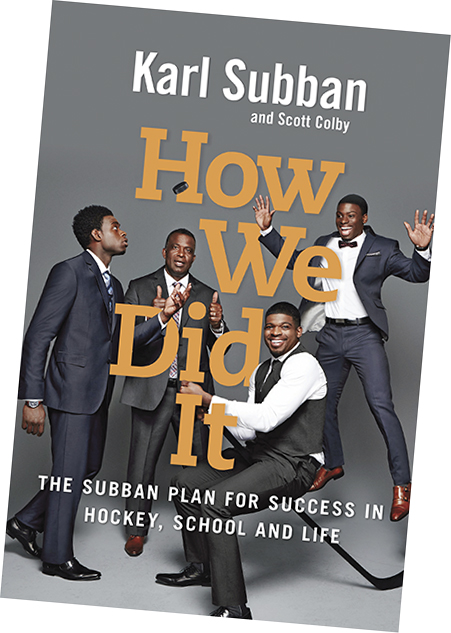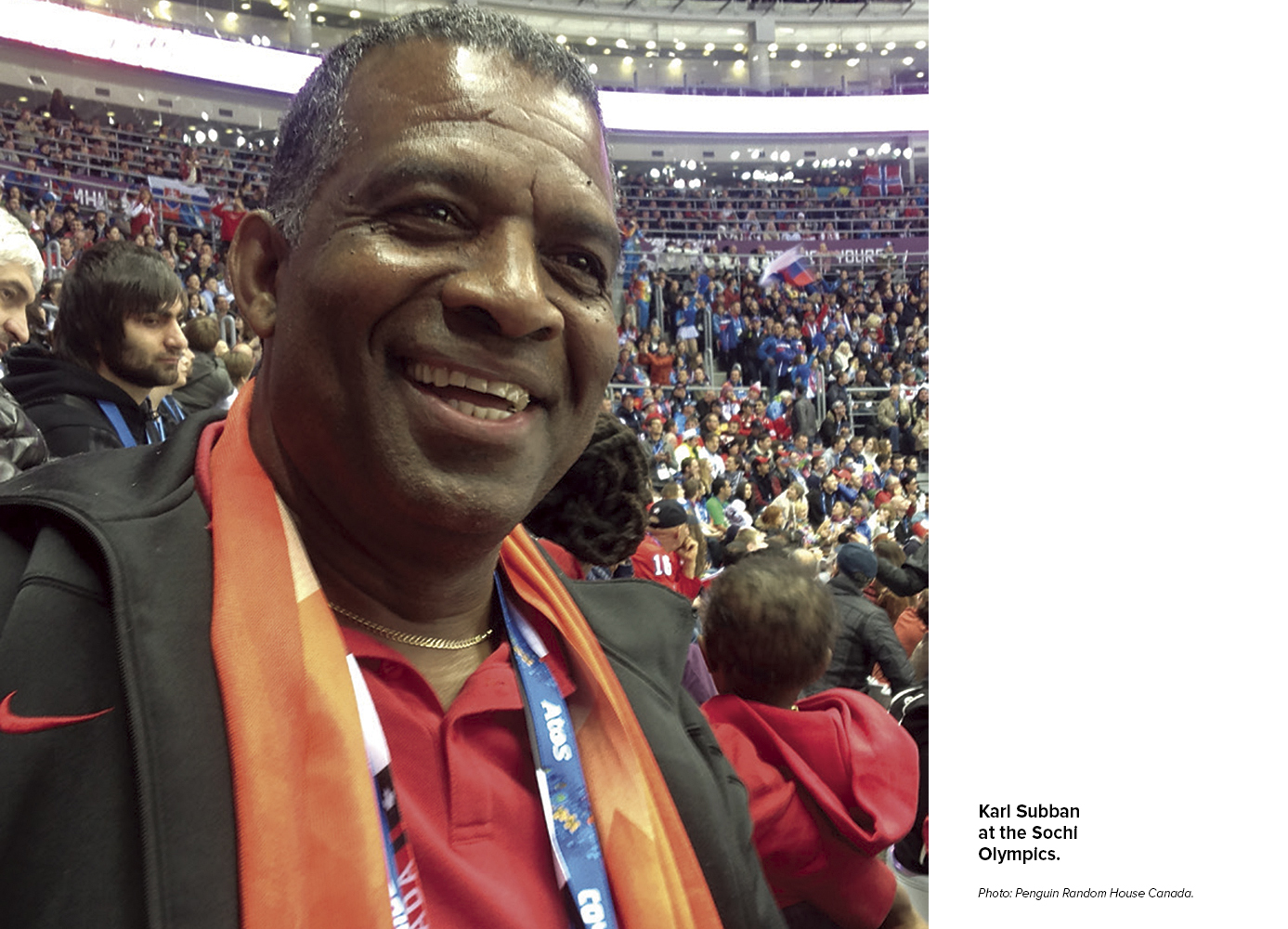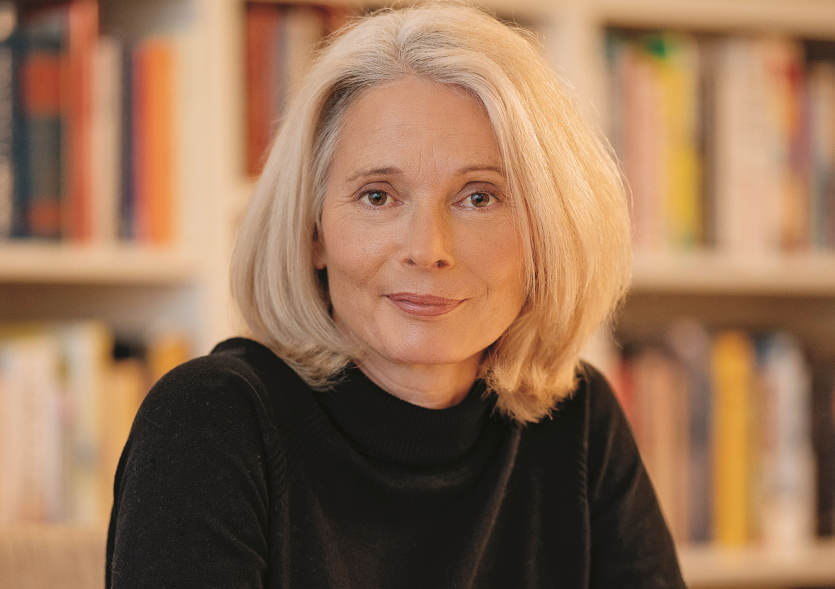It’s all about the journey—and believing in your potential
By Peter Feniak
In recent years, Karl Subban has become a motivational speaker, an author, and a famous hockey dad, but for over three decades, he was an educator in Toronto public schools. During that time, he developed his own approach to motivating students, even the tough cases:
“I tell them, ‘Everyone here is born with a gift called potential. In it is wrapped your skills, your abilities, your capabilities. And it’s in your power to achieve and to have success. But you’ve got to put the work in.’
“I don’t tell children, ‘Believe in yourselves.’ I tell them, ‘Believe in your potential,’” Subban says. “That’s a powerful thing. It’s about what you need to do to move ahead. Most children know where they are; they know their situation. But they need to know what is possible—and how to make things possible.”
As parents, Karl and Maria Subban “put the work in,” encouraging their children to believe in their potential and adding the gifts of love and emotional support. “I don’t know if our kids cared about basketball or hockey all that much,” Subban smiles today. “The most important thing was time with Mom and Dad. We were always there. And that’s what kids value.”
There are five Subban children. The eldest siblings, Nastassia and Natasha, shone on the basketball court in their youth; they are now educators with the Toronto District School Board. Malcolm and Jordan, the youngest sons, were both drafted by the National Hockey League; Malcolm is now a goalie with the Vegas Golden Knights, and Jordan is a defenceman with the Utica Comets of the American Hockey League—a call-up away from a spot with the Vancouver Canucks. The effervescent eldest brother and middle child, Pernell-Karl (P.K.) Subban, is an Olympic gold medalist and NHL all-star—an award-winning defenceman with the Nashville Predators, who stands out as one of the most exciting players on the ice. He has also made headlines for generosity. His $10-million-over-seven-years pledge to Montreal Children’s Hospital was described by the beneficiary as “the biggest philanthropic commitment by a sports figure in Canadian history.”

Photo: Penguin Random House Canada.
Karl Subban, now 59, continues to work on his own potential. After more than three decades as a teacher, vice-principal, and principal, he retired in 2013. Being a famous hockey dad has certainly helped his prominence as a speaker, but wherever he goes, “Big Karl”—tall, broad-shouldered, committed, and articulate, with just a touch of Caribbean lilt in his voice—makes an impression. This past fall, drawing on his family’s “growing-up years” he added “author” to his credits. How We Did It (Random House Canada, 2017), written with Subban’s long-time journalist friend Scott Colby, features Big Karl and his three hockey-playing sons on the cover.
“Many Giving Hands”
The book is subtitled The Subban Plan for Success in Hockey, School and Life. So do the Subbans claim to have it all figured out? Is the theme “We did it—so can you”?
“No, it’s not like that at all,” Subban says. “Because Maria and I didn’t start out with this formula or this recipe. Who does? I knew about the importance of certain practices, developing an emotional attachment to the children, giving them love and affection. And I knew the importance of athletics to my life, how they helped to shape it, how it helped my transition to living in Canada. And with parents, whatever your interests are, you usually take your children along—as musicians might. And sports was a thing for me.”
The Subbans didn’t do it alone. Subban says: “To make it in life, you need many giving hands.” How We Did It credits those who helped along the way. It also shows parents who worked hard, pinched pennies, made mistakes, and stuck together. It recalls the fun of a Jamaican-born dad studying his son’s early hockey gear: “P.K. was four years old…sitting on the couch, barely able to conceal his excitement…the night before his first hockey game ever. I took all the crazy-looking pieces out of the bag. [It was] like a puzzle without the picture on the box… The garter belt mystified me completely.”
The book also recalls low points, notably when P.K., already showing star potential at the age of 10 with an elite AAA atom-level team, found his playing time being limited and grew more and more unhappy at being used as a “spare part”; his parents felt the new team was “not a good environment.” Finally, in the middle of a game, Karl went to the bench and said, “P.K., let’s go.” They headed for the dressing room and out the door.
“I didn’t understand the culture of hockey,” Karl Subban says today. “We love our children. If our children are hurting, we’re hurting. But sometimes it’s good when they face some adversity. You can never lose your cool. It brings attention you don’t want.” He adds, “Something happens to us when we walk through the arena door; sometimes it gets the best out of us and sometimes the worst. You have to learn to control your emotions.”
How We Did It also charms with stories of the family piling into “Betsy,” the family’s well-worn Toyota Corolla. Each of the boys played junior-league hockey a two-hour drive away, with the Belleville Bulls.
A colourful account of the challenges of mixing family life with the demands of sports leagues for kids, the book is also a memoir, and at its heart is the story of how a young boy from Jamaica moved to Sudbury, ON.
“I remember walking to school and crying and walking home and crying,” he says with a smile. “Not because I was having a fight or something. Just because it was so cold. We had no bus for school. We had to walk far. That was the ’70s. I think it’s a lot warmer today.”
Sudbury proved a welcoming home for the Subbans. Karl’s father, Sylvester, a diesel mechanic, came to Canada in 1966 seeking greater opportunity for his family. He worked for Falconbridge Mining for 30 years. Karl’s mother, Fay, came a few months later and found work as a seamstress. “They had good jobs,” Subban says, “but they wanted more. And they wanted more for us.”






